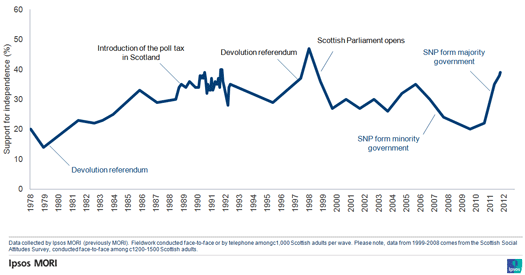35 years of Scottish attitudes towards independence
If the referendum is to be held in Autumn 2014, the SNP has just two and a half years to persuade the majority of Scots to back their vision of an independent Scotland. An analysis of over 30 years of Ipsos polling on the issue shows this will be no easy task.
Ipsos (formerly MORI) has been polling Scots on their attitudes to independence and devolution since 1978 and can track how views have changed over nearly 35 years. Although the wording of the question and the method for collecting opinion have occasionally changed, we are able to illustrate the fluctuations in support for independence over this period.

What is most noticeable from a look back at the data is that, despite peaks and troughs where support exceeded 40% or fell below 20%, backing for independence has remained fairly constant, at least since the mid 1980’s. In the 51 polls conducted since 1986, 39 showed support between 30% and 39%, while only nine polls showed support below 30% and just three showed support above 40%. This suggests that, although support for independence has grown significantly over the past few years, this does not necessarily represent a new surge in support, but rather is a return to previous levels of support, seen for example, during the 1990s.
However, it is clear that support for independence is far higher than when we began polling in the late 1970s. On the eve of the first referendum in March 1979, only 14% of Scots backed ‘a completely independent Scottish Assembly, separate from England’, although 42% did back the establishment of a Scottish Assembly as part of the UK. Of course, 52% of Scots backed the provisions of the 1978 Scotland Act to create a devolved assembly but the Act was repealed as support fell below 40% of the total Scottish electorate.
In the early 1980s, support for independence was relatively low, never exceeding 25%, coinciding with a time of internal ructions and poor electoral performance of the SNP (support for the party fell to 11.7% at the 1983 General Election). It was not until the later years of the Thatcher government and, more specifically, the introduction of the poll tax in Scotland, that support for independence began to grow. In each poll between late 1988 and the mid-1990s support did not fall below 30% and reached 40% in 1991 and 1992. This increase in support coincided with the collapse in support for the Conservatives in Scotland as well as the growth in support for the SNP over this period (reaching 22% in the 1992 General Election).
The highest recorded level of support for independence came in our April 1998 poll when 47% of Scots backed ‘full independence for Scotland.’ Given the timing of the poll this is unsurprising; Scots were still basking in the glow of the 1997 referendum where 74% had backed devolution and the new Parliament was due to begin its work in 1999. Feelings of national pride may also have been enhanced by Scotland’s participation in the forthcoming football World Cup, the first time the national team had qualified since 1990.
Famously, the former Labour Cabinet Minister George Robertson said that ‘devolution will kill nationalism stone dead.’ Although that comment is now much derided, evidence from our polls in the first few years of a devolved administration suggested that, if not killed stone dead, nationalist sentiment was on the wane. For five years after December 1999 no single poll showed support for an independent Scotland to be above 30%. Even after the election of a minority SNP government in 2007, support for independence slipped, going as low as 20% in our November 2009 poll. Perhaps Scots thought that a nationalist government would do a sufficiently good job in representing their views without the need for separation from the rest of the UK.
Since the election of a majority SNP government after the 2011 Holyrood elections, support for independence has risen. The promise of a referendum at some point during the current parliamentary term has meant that the issue has risen up the political agenda. The political dominance of the SNP and of Alex Salmond since the election has allowed the Scottish Government to dictate the independence debate, contrasting themselves with a Tory-led government at Westminster overseeing a period of austerity which they say is damaging Scots. At the same time, all the unionist parties in Scotland are going through a transitional period, with each having elected a new leader since the 2011 election. Each party is also manoeuvring to adopt a nuanced and distinct position on the constitutional issue. All this has meant that no clear leader from the unionist side has emerged to take on Alex Salmond and the SNP.
Despite recent increases in support for independence, majority backing for the nationalist vision remains out of reach for now and an analysis of our polling reinforces the difficulty of achieving that goal. However, it is clear from all our recent polling that most Scots want further devolution, with our latest poll for The Times showing 71% backing the concept of ‘Devolution Max’, devolving substantial new powers and tax-raising responsibilities to the Scottish Government.
Scots who currently tell us that they want more devolution but wish to remain part of the UK will be the key group in deciding the referendum. The challenge for the nationalists is to persuade this group to take the extra leap of faith towards an independent Scotland, while unionists must persuade this group that they can accommodate their hunger for greater autonomy without the need to break up the UK. Our polls in the next few years will be a crucial barometer of which way voters will turn.
This article was originally published in The Times.



